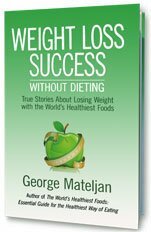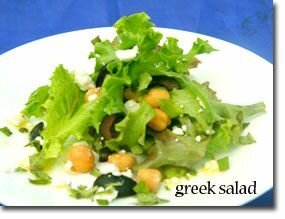Check Out What's New On Our Website
 Find out how to keep your New Year's resolution and lose those extra pounds with our Weight Loss Success-Without Dieting book. Take advantage of our special offer and save $7.00. You pay only $17.00!What's New in 2013
Find out how to keep your New Year's resolution and lose those extra pounds with our Weight Loss Success-Without Dieting book. Take advantage of our special offer and save $7.00. You pay only $17.00!What's New in 2013
healthy food tip and recipe
Today's Recipe
If you don't know what to serve for dinner tonight ...
The chopped mint adds an unusual twist to this easy-to-prepare salad that is great for lunch.

Ingredients:
- 4 cups salad greens
- 2 TBS chopped mint
- 3 TBS crumbled feta cheese
- 2 TBS chopped olives
- 1/2 cup garbanzo beans
- 1 TBS extra virgin olive oil
- 1 TBS red wine vinegar
- sea salt and pepper to taste
- Combine first five ingredients.
- Toss with olive oil and vinegar, and add salt and pepper to taste.
In-Depth Nutritional Profile for Greek Salad
Healthy Food Tip
What are proteins and why do we need them?
Proteins are astonishing nutrients because they are so fundamental to our very architecture as humans. Our cells and organs, our muscles, our connective tissue, and even our bones could not hold together as the key body parts they are without the help of protein. This importance of protein to our very structure is only one function played by proteins, however. Proteins are equally important to our metabolism because all enzymes in our body that help trigger chemical reactions are proteins. Many of our most important regulatory hormones, like insulin, are also proteins. So are many of the key molecules in our immune system as are the major molecules used to carry nutrients around our body. Whether they are structural proteins, immunoproteins, hormonal proteins, transport proteins, or enzymes, proteins are of utmost importance to our health. The importance of protein to our life is reflected in the term itself: protein is derived from the Greek term protos, which means "taki ng first place."
Proteins are made up of smaller molecules called amino acids that are strung together by chemical bonds like beads on a chain. To become an active, functional protein, this string of amino acids folds in on itself forming a twisted and entwined three-dimensional structure. Proteins come in many sizes. Some chains of amino acids are quite small, like the hormone insulin that is only 51 amino acids long. Most proteins, however, are larger. Most of proteins in your body contain between 200-400 amino acids.
Amino acids are similar to simple sugars, insofar as they serve as the building blocks for all other molecules found within their nutrient category. Just as carbohydrates are composed of monosaccharides, proteins are composed of amino acids. And, in a manner similar to the digestion of carbohydrates, your body can break proteins down to amino acids during the digestion process, taking in only the small single amino acid unit, or sometimes a two or three amino acid unit. Like carbohydrates, amino acids are composed of carbon, hydrogen, and oxygen. However, unlike carbohydrates, amino acids also contain nitrogen. In fact, amino acids are your body's primary way of getting nitrogen.

No comments:
Post a Comment